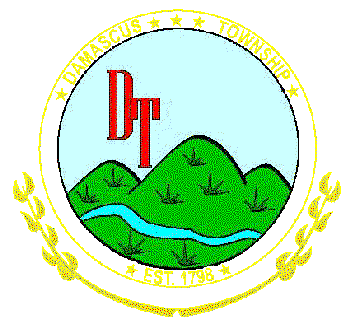
WAYNE COUNTY, PENNSYLVANIA
60 CONKLIN HILL ROAD, DAMASCUS, PA 18415

 |
WAYNE COUNTY, PENNSYLVANIA 60 CONKLIN HILL ROAD, DAMASCUS, PA 18415 |
 |

NEWS ITEMS COURTESY OF THE PENNSYLVANIA TOWNSHIP NEWS MAGAZINE
PRESENTED BY THE DAMASCUS TOWNSHIP BOARD OF SUPERVISORS
Township Today Newsletter and Article Archive - Winter 2008
Township Government is Open Government
A recent newspaper editorial proclaimed that “the citizens of Pennsylvania for too long have been the victim of one of the least open governmental systems, both at the state and local levels.”
This is a popular sentiment in these reform-minded times. However, if you stop by your township office or attend a board of supervisors meeting, you will quickly learn that quite the opposite is true. Far from being shrouded in mystery, townships and the officials that serve them are an open book, conducting most business for all eyes to see and willingly turning over public records to citizens who request them.
This isn’t something new. Townships have operated this way for many decades, guided by several state laws, including the Open Records/Right-to-Know Act, which passed in 1957 and made it possible for citizens to have greater access to state and local government documents. This information not only details the inner workings of government but also sheds light on how tax dollars are being spent.
“Lately, in Harrisburg and elsewhere, there’s been a lot of talk about making government more open,” says R. Keith Hite, executive director of the Pennsylvania State Association of Township Supervisors, which represents the commonwealth’s 1,455 townships of the second class. ‘That’s understandable. Ever since the controversy involving the legislative pay raise, which ushered more than 50 new legislators into the Capitol, change has been in the air.
“While openness may be a problem in some branches of government, it’s not a problem in local government, particularly township government. Why? Because local officials live in the communities they serve and are just a phone call away from their constituents. Therefore, doing the right thing is second nature to many of them. Without question, the accountability of these public servants is unmatched.”
Still, lawmakers and powerful special interests have continued to question the effectiveness of the Open Records Law, which for the second time this decade has undergone significant changes.
Clearing up the confusion
The last time the Pennsylvania General Assembly rewrote the Right-to-Know Law was in 2002. This was done amidst feelings that the original act, passed more than four decades before, was antiquated and vague.
There was some truth to that. For instance, the courts have spent years trying to sort out what exactly constitutes a “public record” under the previous law’s long-winded and convoluted definition.
The act tested others, too, including township officials, who also had difficulty interpreting it. However, the irony is, when lawmakers approved the 2002 rewrite, they included a clear list of do’s and don’ts for local officials but did nothing to clarify the definition of a public record.
All of that changed in February when Gov. Ed Rendell signed an updated version of the Open Records Law, which, for the first time in the state’s history, brings the Pennsylvania General Assembly under its wing. The new law, scheduled to go into effect in January 2009, also asserts that all government records are public unless specifically included on a list of exempted documents.
For instance, public officials and employees won’t be required to give up their Social Security numbers, home or personal cell phone numbers, and certain tax documents, among other things. Police investigation reports, employment applications, drafts of bills, and grievance materials are off limits, too.
“The exemption list is a good thing for townships and their residents because it takes the guesswork out the equation,” Hite says. “Now, residents don’t have to wonder: ‘Is this document something I’m entitled to see?’ If it’s not on the list, then they have every right to request a copy of that particular record.”
The new Open Records Law also requires your township to designate an employee as its open records officer. This person will be your point of contact when seeking a record. The state will also be establishing an Office of Open Records in the Department of Community and Economic Development. This independent office will not only hear open records appeals but it will also train township officials on open records/meeting issues.
While the law includes several new provisions, it retains many of the same procedures that were established in the 2002 rewrite.
For instance, townships are still required to have an open records policy, which must be posted prominently in their office; they must respond to all written requests for records within five business days; they must have a solid legal reason for denying a request; and they must put that denial in writing.
The law also authorizes the courts to impose fines of up to $1,500 on local officials who willfully violate the statute. In addition, violators may also be fined $500 for each day they fail to comply with a court order to provide a record.
Support for reform
To a certain extent, the new Open Records Law is a direct result of the controversial legislative pay raise of 2005. Since then, reform-minded lawmakers, special interests, and citizen groups have been pushing for greater government transparency.
Hite believes that the law sends a powerful message to Pennsylvanians: that officials at all levels of government support meaningful reform. At the same time, though, he points out that openness is nothing new for Pennsylvania’s townships.
“Local government is the government closest to the people,” Hite says. “That’s why you’ll always find the door to your township and its records open. That’s just good governing. And that’s what today’s townships are all about.”